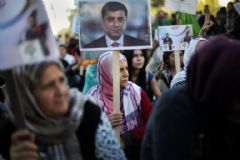Human Rights Voices
While the UN devotes its human rights operations to the demonization of the democratic state of Israel above all others and condemns the United States more often than the vast majority of non-democracies around the world, the voices of real victims around the world must be heard.
Turkey, February 21, 2017
Turkey Punishes 2 Opposition Leaders as Crackdown Continues
Original source
Turkish officials handed down punishments on Tuesday to two leaders of a major opposition party who have become casualties of a wide-ranging crackdown on dissent that escalated after a failed coup in July.
Selahattin Demirtas, a leader of the pro-Kurdish Peoples' Democratic Party, was sentenced on Tuesday to five months in jail for insulting the Turkish state, the Turkish nation and their institutions. Hours earlier, Figen Yuksekdag, the other leader of the party, was expelled from Parliament after the country's top court upheld her conviction for a terrorism offense.
Both have been in custody since being detained in raids in November. Thousands of members of their party, known as the H.D.P., have also been arrested since the breakdown of Kurdish peace talks in 2015, including at least a dozen of their 59 members of Parliament.
The arrests of party members accelerated after the failed coup, which also set off an even larger purge of government officials and people suspected of being dissidents.
More than 45,000 government officials, soldiers, police officers, teachers and journalists have been arrested since the coup attempt, most of them suspected of having connections to the Gulenist movement, a group led by Fethullah Gulen, an exiled cleric living in the United States, that Turkey believes was behind the attempted putsch.
The government accuses the H.D.P. of links to a Kurdish militia that has been designated a terrorist group by Turkey, NATO and the European Union.
But on Tuesday, the H.D.P. said it was being targeted as part of a wider crackdown on political opposition ahead of a controversial April referendum in which President Recep Tayyip Erdogan is encouraging Turks to grant him greater executive powers.
"It is totally about the referendum," Hisyar Ozsoy, an H.D.P. member of Parliament, said by telephone on Tuesday. "He's committed to paralyzing the H.D.P. organizationally so that we can't carry out an effective 'no' campaign."
The H.D.P., Turkey's fourth-largest party, received just over 10 percent of the vote in the most recent parliamentary elections, but its leaders believe its supporters could make the difference in a close vote on the referendum. A charismatic leader, Mr. Demirtas had widened the party's appeal beyond its Kurdish base before the crackdown intensified.
Mr. Erdogan's opponents say that a victory for him in the referendum would lead to one-man rule, while his supporters argue that it would merely create a United States-style presidency and bring stability to Turkey.
The Turkish news media has reported that the government is worried enough about a victory for the "no" campaign that officials in Konya, a city in central Turkey, recently withdrew from circulation an antismoking pamphlet that contained the word "no." A local member of Parliament there from Turkey's governing party said the pamphlets had been recalled to avoid "confusion," the Turkish newspaper Hurriyet Daily News reported.
Mr. Erdogan has previously told reporters "those who say no will be siding with July 15," referring to the date of the coup attempt.
Andrew Gardner, the Turkey researcher for Amnesty International, said, "It's hard to imagine how the situation could get any worse in the run-up to the April referendum."

